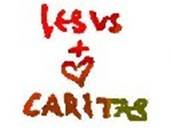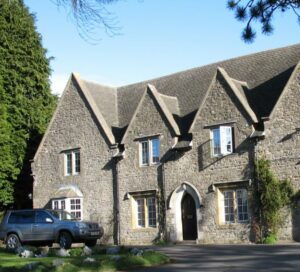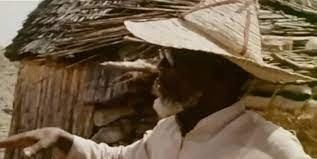(Español) Horeb-Ekumene, junio 2023
Luc TERLINDEN, Brussels fraternity, archbishop Brussel-Malines
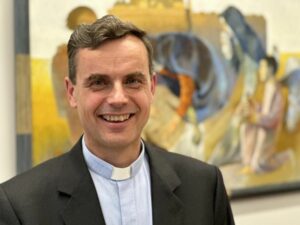 Luc Terlinden, the current Vicar General of the Archdiocese of Mechelen-Brussels, was presented this afternoon as the new archbishop.
Luc Terlinden, the current Vicar General of the Archdiocese of Mechelen-Brussels, was presented this afternoon as the new archbishop.
For the first time in almost a century (since Cardinal Van Roey in 1926), a priest who is not yet a bishop is named archbishop. Therefore, Luc Terlinden from Brussels is not yet very well known to the general public. For the last two years, as Vicar General of the Archdiocese of Mechelen-Brussels, he has been the right hand of the current Archbishop, Jozef De Kesel.
Terlinden is the tenth archbishop since the creation of independent Belgium. With Terlinden’s appointment, the Holy See is already following the principle of alternately naming a Flemish and French speaker.
Terlinden is 54 years old. That seems young, but that is completely in line with the age of his predecessors – Danneels was 46 years old – and of the archbishops who are named in other parts of the world.
Youth Ministry
Terlinden only made the move to the seminary after his studies in economics and after some work experience in education.
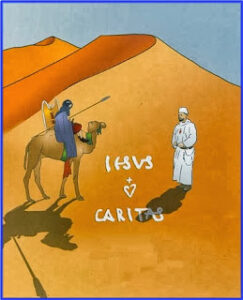 She then followed a specialization in moral theology in Rome. For her doctoral thesis, she studied the writings of spiritual teachers such as Charles Taylor and John Henry Newman. He gained pastoral experience in parishes and youth ministry, which left him with a lasting commitment to the Brussels Marolles and to young people (in student ministry in Louvain-La-Neuve and as co-founder of Pôle Jeunes XL in Ixelles). In 2017, he became president of the French-speaking diocesan seminary and a member of the bishop’s council. In 2021 Terlinden became Vicar General of the Archdiocese of Mechelen-Brussels. It’s a steep climb for someone who leads a very simple life as a member of the priestly fraternity of Charles de Foucauld, a French priest who came to live among the Tuareg in Algeria at the turn of the 20th century.
She then followed a specialization in moral theology in Rome. For her doctoral thesis, she studied the writings of spiritual teachers such as Charles Taylor and John Henry Newman. He gained pastoral experience in parishes and youth ministry, which left him with a lasting commitment to the Brussels Marolles and to young people (in student ministry in Louvain-La-Neuve and as co-founder of Pôle Jeunes XL in Ixelles). In 2017, he became president of the French-speaking diocesan seminary and a member of the bishop’s council. In 2021 Terlinden became Vicar General of the Archdiocese of Mechelen-Brussels. It’s a steep climb for someone who leads a very simple life as a member of the priestly fraternity of Charles de Foucauld, a French priest who came to live among the Tuareg in Algeria at the turn of the 20th century.
Kesel’s right hand
As Vicar General of the Archdiocese of Mechelen-Brussels, Terlinden became Cardinal Jozef De Kesel’s right-hand man and a central figure in the Archdiocese. Since then he has lived with his dachshund Oscar in Mechelen. People who know him well call him a bright, collegiate and hard-working man, who has a brotherly attitude and can also stop once in a while to enjoy life.
In an interview on Kerk & Leven (April 7, 2021), Terlinden said that the World Youth Days in Rome in the year 2000 were a profound experience for him, like a military pilgrimage to Lourdes during his military service. He was raised in the faith and considered becoming a priest at a young age, but the obligation of celibacy made him hesitate.
Synod on synodality
As archbishop, Terlinden wants to focus on synodality. Cardinal De Kesel played an important role in the continental synod through his input on how to deal with modern and secularized society and as a bridge figure. We can assume that his successor will also take charge of that torch.
He said of celibacy at Church & Life in 2021: ‘We are also learning more and more that priesthood and celibacy are not necessarily the same thing. I believe in the great value of celibacy, but we often forget that the vocation to celibacy is an exception. The media focuses a lot on the celibate priesthood, but our Church has several vocations within it. Now it’s about going together on the road.”
In September, Luc Terlinden awaits episcopal consecration first, to assume his functions as archbishop on September 3, 2023.
PDF: Luc TERLINDEN, Brussels fraternity, archbishop Brussel-Malines eng
(Italiano) Tu sei con noi. Piccole Sorelle di Gesù
Little Sisters of Jesus, June 2023
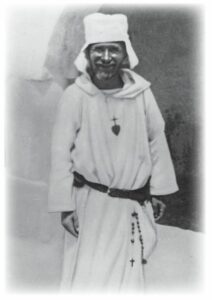 Inside this issue of News Notes
Inside this issue of News Notes
- A Short Biography of Charles de Foucauld, p. 2
- Observations from Outsiders, p. 5
- Finding Ones’ Place – Rwanda, p. 11
- Love Takes Time, France, p. 12
- Foucauld in Colonial Algeria, p. 16
- A Relationship – ls Kathleen, p. 22
- The Voice of Palestine, p. 25
- Home for Christmas – Iraq, p. 28
- Contemplative in the Heart of the World – Cuba, p. 30
- A Moment of Trust – Lebanon, p. 32
- Presence Where the Church is Absent – Burkina Faso, p. 34
- To Bring Jesus – Vietnam, p. 36
- Prodigal Son – Northern Ireland, p.38
- A Simple Glass of Water – Pakistan, p. 40
- One Person at a Time – Argentina, p. 41
- The One and Only Model – Chile, p 43
- Celebration at the Source – Morocco, p 44
- Snapshots from Around the World, p 48
- The Prayer of Abandonment, p 50
Read the full document in PDF: NN2022
Little Brothers of Jesus, June 2023
- Far from the temples of the powerful – (Laurent) – p. 3
- Let myself be welcomed – (Christian) – p. 5
- Dare to address conflicts and difficulties – (Mirek) – p. 9
- Touching the flesh – (Hervé) – p. 13
- What does our task of announcing the Kingdom consist in? – (Taher) – p. 21
- Peacemakers – (Rodrigo) – p. 26
Read the full document in PDF: Little Brothers of Jesus – June2023
BeBrothers, UK and Ireland, June 2023
- Editorial
- Fraternity news
- Letter to the brothers
- Bishops of N. Africa
- A brother’s calling
- Spring message for Irish brothers
- Desert day deserted?
- To Rome with Clifton
- Post-Christmas retreat
- E.mails to the editor
- Obituary
- For your recruitment
- Periodical received
- Contact reminders
- And, as always, much more!
Read the full document in PDF: Be BrothersA4June2023
(Italiano) Piccoli Fratelli di Jesus Caritas, giugno 2023
Baba Simon, the missionayçry whit baare feet
Saturday June 10, 2023
Baba Simón, the missionary with bare feet
(From “ECHOES OF THE SAVANNAH”)
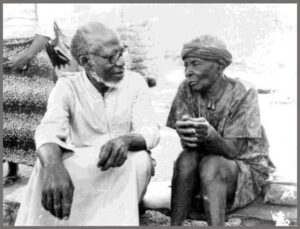 On Saturday May 20, the Pope Francis recognized the heroic virtues of the Cameroonian diocesan priest Fr. Simon Mpeke. Thus he became the first Cameroonian “blessed”.
On Saturday May 20, the Pope Francis recognized the heroic virtues of the Cameroonian diocesan priest Fr. Simon Mpeke. Thus he became the first Cameroonian “blessed”.
Simon Mpeke was born around 1906 in Pongo, a village in the dense jungle of southern Cameroon, into a family of peasants from the Bakoko ethnic group.
His parents were not Christians since the first Catholic missionaries had arrived on the coast of this country only a few years before his birth, in 1895. After finishing his studies at the Catholic missionary school of the Pallottine missionaries of German origin, he asked for baptism. , which he received on August 14, 1918, when he was 12 years old under the name of Simón. He became a teacher and taught for a while.
Until then the priests were all foreign missionaries, German and French and it was thought that Africans could not be. In 1921, when Simón discovered that “a black man could become a priest”, he did not doubt it. He breaks up with the young woman who had been promised to him and begins to study Latin with a small group of friends. In August 1924 they became part of the Yaoundé Minor Seminary, which had opened its doors in July 1923. There he left the memory of an excellent, serious, very pious and peaceful seminarian.
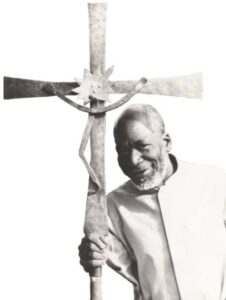 He is part of the group of the first eight Cameroonian priests ordained on December 8, 1935. He worked for twelve years as vicar in a Mission in the middle of the countryside, where he leaves the memory of a very zealous and very spiritual priest, who amazes people. and it is given without limits.
He is part of the group of the first eight Cameroonian priests ordained on December 8, 1935. He worked for twelve years as vicar in a Mission in the middle of the countryside, where he leaves the memory of a very zealous and very spiritual priest, who amazes people. and it is given without limits.
Marked by the theology of his time, he takes a very firm position against the traditional religious practices of the region. Regarded as a priest of great value, he was appointed in 1947 to the great parish of New-Bell, in Douala, where he was appointed parish priest. Simón gives great impetus to the parish, creating groups, supporting the Catholic Action movements and schools and always being available and with great generosity towards his parishioners.
The establishment of the fraternities of the Little Brothers and Little Sisters of Jesus, at the beginning of the 1950s, made him discover the spirituality of Carlos de Foucauld. In 1953 he became part of the secular Institute of the Brothers of Jesus and asked for a sabbatical year to do his “novitiate” in Algeria.
He will be one of the founders at the international level of the Jesus-Caritas Priestly Union and its first person in charge in Cameroon and in Africa.
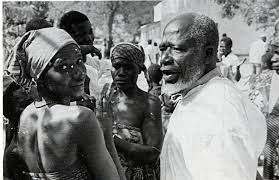 A much loved and influential priest, he was even proposed, along with two others, to the position of assistant to his Bishop. Around 1954 he felt the call to participate in the evangelization of the so-called “pagan” peoples of North Cameroon. After having reflected for a long time, carried away by the missionary dynamism of the Encyclical “Fidei Domun”, he would become in 1959 the first secular Cameroonian missionary priest in his own country.
A much loved and influential priest, he was even proposed, along with two others, to the position of assistant to his Bishop. Around 1954 he felt the call to participate in the evangelization of the so-called “pagan” peoples of North Cameroon. After having reflected for a long time, carried away by the missionary dynamism of the Encyclical “Fidei Domun”, he would become in 1959 the first secular Cameroonian missionary priest in his own country.
After a brief stay in a community of little brothers of Jesus, he settled in Tokombéré, in the current Diocese of Maroua-Mokolo, more than a thousand kilometers from his town.
In previous centuries, hordes of Muslim horsemen of Peul origin, coming from neighboring Nigeria, had forced the clans that had settled since the dawn of time in that fertile plain to move towards the rocky mountains, to protect themselves from their attacks. These people were called kirdi pejoratively by Muslims, which seems to mean kaffir or uncircumcised.
Immediately he began to be called “Baba Simón” (Papa Simón) by the local population. He traveled the mountains tirelessly preaching the Gospel to the inhabitants of this mountainous region. Living in great simplicity he is called the “barefoot missionary”, he will dedicate his life to fight against the misery in which these people live. Affirming, according to a Muslim scholar, that misery is an «enemy of God».
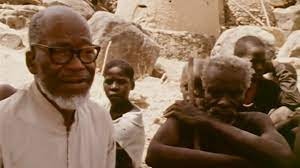 His intense prayer life and his communicative joy make him a luminous witness of God’s love even in the towns furthest from his vast parish. Under his guidance and his example, a fervent Christian community was born. A single passion animated Baba Simon: to give Jesus Christ to the Kirdi and give them instruments to free themselves from all slavery. Baba Simón insisted on the importance of the school. But, after the first failures, he understood that it was necessary to win the confidence of the Kirdi before anything else. From here was born what was called “the school under the tree”.
His intense prayer life and his communicative joy make him a luminous witness of God’s love even in the towns furthest from his vast parish. Under his guidance and his example, a fervent Christian community was born. A single passion animated Baba Simon: to give Jesus Christ to the Kirdi and give them instruments to free themselves from all slavery. Baba Simón insisted on the importance of the school. But, after the first failures, he understood that it was necessary to win the confidence of the Kirdi before anything else. From here was born what was called “the school under the tree”.
Through the school, the health structures, the commitment against injustice, the accompaniment of young people and the call to universal fraternity, it allowed a real promotion of populations underestimated until then. His concern for permanent dialogue with those responsible for traditional religions and the encounter with Muslims has made him a precursor of inter-religious dialogue and has earned him the name by which he is still revered after his death, both by Christians and by not Christians.
A few months before he died, he wrote these notes: “Everything that surrounds me breathes God. The entire universe is a home of life. To stand before God, one does not have to imagine Him anywhere else but in us where He is, in our action where He acts, in our neighbor where He lives.When we die, our body will be buried in the earth of God where it will wither in God and wake up in the Ocean of Eternal Life… To believe is to become aware of the Life… in God”!
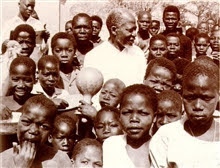 Baba Simón listens, heals and helps. He tries to understand. He, who in his first parish in the South, in 1936, broke the drums of traditional religion, delves into his spiritual vision of men and of God. He sees the suffering of these peoples. Throughout his walks in the mountains and his meetings, everything becomes clear: announcing Jesus means building man, the whole man, through the Good News. These men, considered slaves, listen to Baba Simon tell them that they are children of God, loved by God. And that they are brothers.
Baba Simón listens, heals and helps. He tries to understand. He, who in his first parish in the South, in 1936, broke the drums of traditional religion, delves into his spiritual vision of men and of God. He sees the suffering of these peoples. Throughout his walks in the mountains and his meetings, everything becomes clear: announcing Jesus means building man, the whole man, through the Good News. These men, considered slaves, listen to Baba Simon tell them that they are children of God, loved by God. And that they are brothers.
Over the years, Tokombéré became the site of an unusual pastoral experience of human and spiritual promotion. On August 13, 1975, he died, completely exhausted, at the end of a life entirely consecrated to God and men.
We entrust this region of the Far North of Cameroon, so permanently exposed to the terrorist group Boko Haram, to the intercession of Baba Simon, so that Christians keep their coolness and continue to bear witness to “the Good News of Jesus”.



